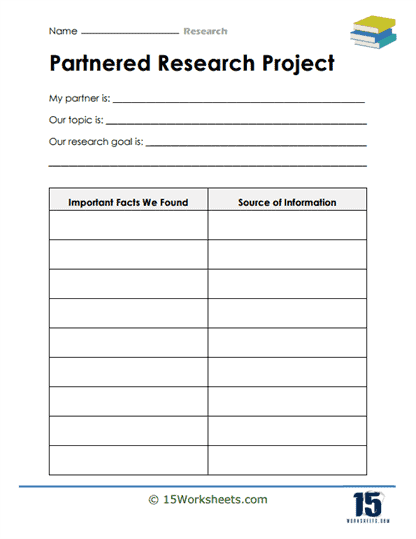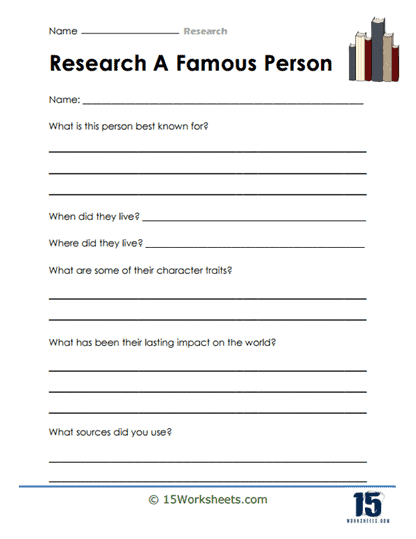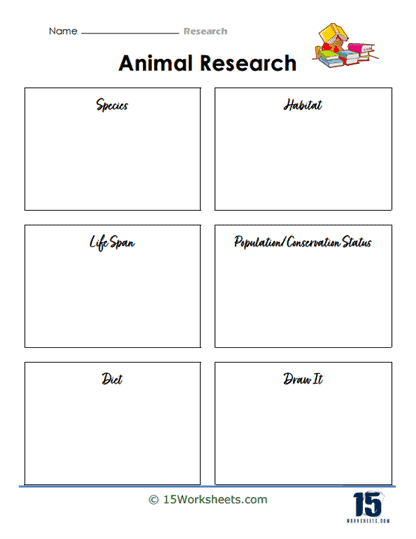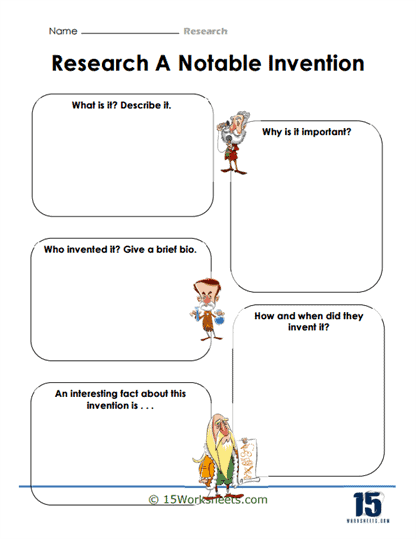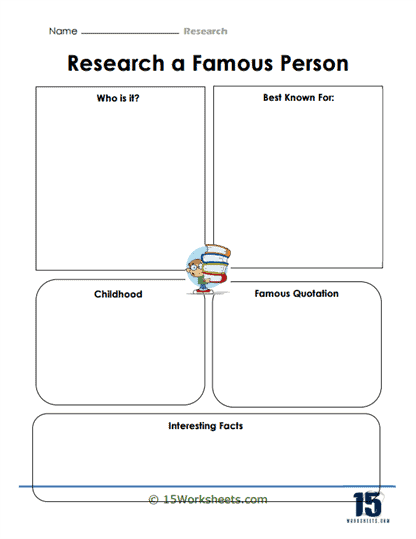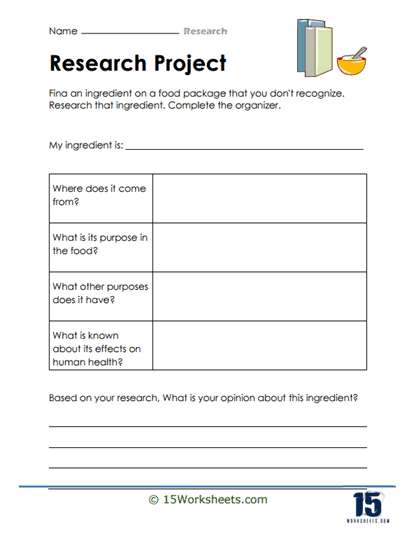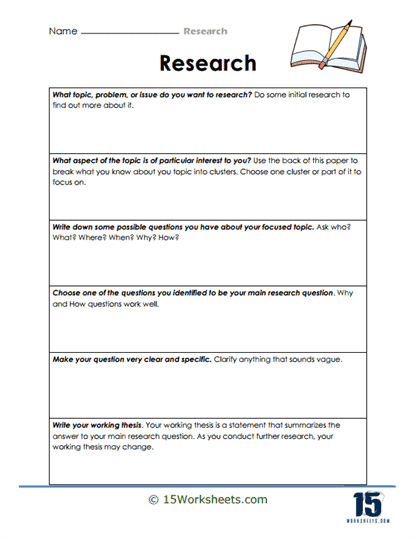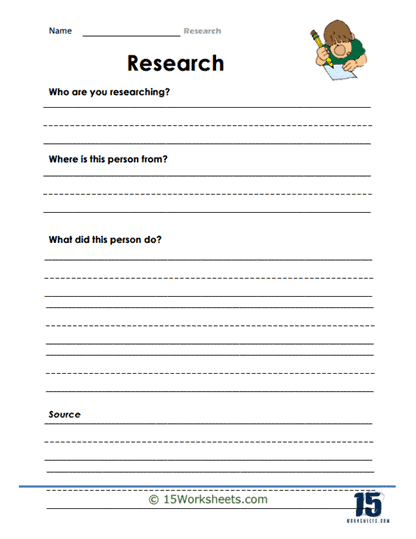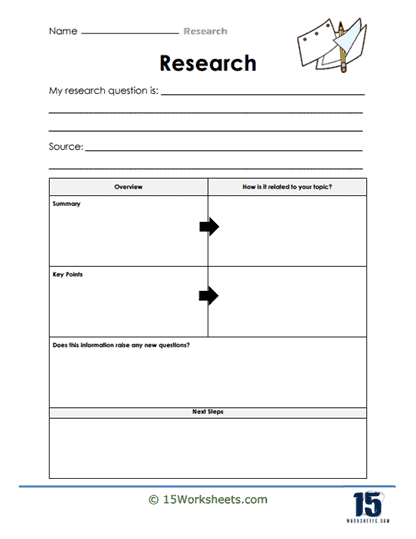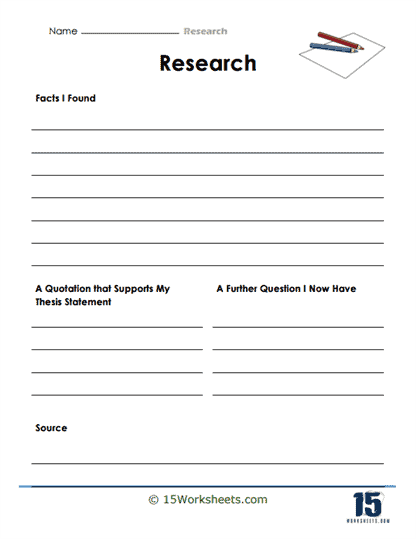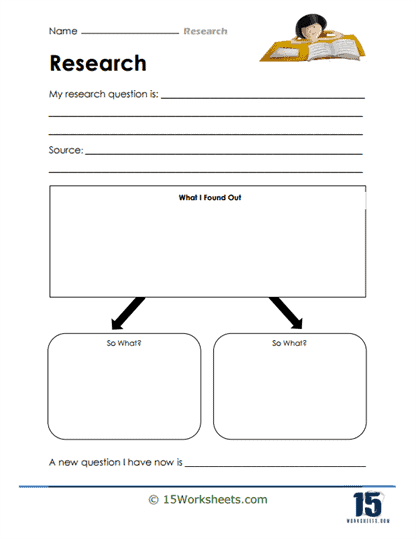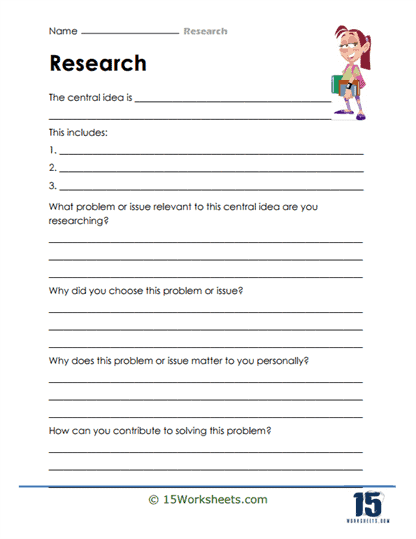Research Worksheets
All About These 15 Worksheets
This series of 15 worksheets on Research is designed to help students develop essential skills for conducting thorough and effective research on various topics. These worksheets cover a wide range of research-related topics, including partnered research projects, researching famous individuals, conducting independent research projects, utilizing internet resources, exploring animal research, and investigating notable inventions.
By engaging with these worksheets, students can enhance their information literacy, critical thinking, and research skills, enabling them to gather and analyze information, synthesize findings, and present their research in a coherent and well-supported manner. Through these worksheets, students will:
- Work in pairs to investigate a specific topic or theme, honing their collaborative research skills;
- Explore various sources, synthesize information, and present their findings in a creative and informative way;
- Be guided through the research process, including selecting a topic, formulating research questions, gathering and analyzing information, and presenting their research in a structured manner;
- Evaluate the credibility of online sources, refine search queries, and navigate through digital information effectively;
- Explore both primary and secondary sources, including scientific journals, books, and documentaries, to gather accurate and reliable information for an Animal Research;
- And critically analyze the significance of their chosen notable invention and present their research findings in a clear and engaging manner.
This series of worksheets on Research offers students a variety of engaging topics to develop and enhance their research skills. By engaging with these worksheets, they can practice gathering information from diverse sources, critically evaluating information, synthesizing findings, and effectively presenting their research. The ability to conduct research is a valuable skill that supports academic success and encourages lifelong learning. Overall, these worksheets provide students with practical guidance and opportunities to explore different research topics, fostering their intellectual curiosity and equipping them with the tools necessary for effective research.
What is Research?
Research is a systematic process of collecting, analyzing, and interpreting information to increase knowledge, solve problems, or answer questions about a specific topic or subject. It is a crucial component of scientific inquiry, academic pursuits, and decision-making processes in various fields, such as social sciences, natural sciences, humanities, medicine, and business.
There are several types of research, including:
Basic Research
Also known as fundamental or pure research, basic research aims to expand knowledge and understanding of a subject or phenomenon without immediate practical application. It seeks to uncover new theories, principles, or concepts that can form the basis for future applied research.
Applied Research
Applied research focuses on using existing knowledge and findings to address specific, practical problems or develop new products, techniques, or solutions. It is often driven by the needs of industries, governments, or other organizations.
Qualitative Research
This type of research explores the underlying reasons, opinions, motivations, or behaviors related to a topic. It relies on non-numerical data, such as interviews, observations, or textual analysis, to gain in-depth understanding and insights.
Quantitative Research
Quantitative research seeks to quantify data and draw conclusions through statistical analysis. It uses numerical data and structured methods, such as surveys, experiments, or questionnaires, to test hypotheses or examine relationships between variables.
Descriptive Research
Descriptive research aims to describe the characteristics of a phenomenon, situation, or population. It may involve the collection of data through observation, surveys, or case studies to provide an accurate representation of the subject being studied.
Experimental Research
In experimental research, researchers manipulate one or more variables to observe their effects on other variables. It is often used to establish cause-and-effect relationships and test the effectiveness of interventions or treatments.
Longitudinal Research
Longitudinal research involves the collection of data over an extended period to examine changes or trends in a particular subject or population. It can help identify patterns, relationships, or causal factors that emerge over time.
Effective research requires a well-defined research question or hypothesis, a systematic approach to data collection and analysis, and the ability to draw valid conclusions based on the evidence gathered. It also involves critical thinking, attention to detail, and adherence to ethical standards to ensure the credibility and reliability of the findings.
How to Improve Your Research Skills
Improving your research skills can enhance your academic performance, problem-solving abilities, and decision-making processes. Here are some tips to help you develop and refine your research skills:
Define Clear Research Questions or Objectives
Begin by identifying a specific topic or issue you want to explore. Develop clear, focused research questions or objectives that guide your research process and help you stay on track.
Familiarize Yourself with Various Research Methods
Learn about different research methodologies, such as qualitative, quantitative, and mixed-methods approaches. Understanding the strengths and limitations of each method will help you choose the most appropriate approach for your research.
Develop a Plan
Create a structured plan outlining your research objectives, methods, data sources, and a timeline for completing your project. This will help you stay organized and ensure you allocate sufficient time and resources for each stage of the research process.
Learn to use a Range of Resources
Become proficient in using various research tools and resources, such as libraries, databases, search engines, and reference materials. Familiarize yourself with both print and digital resources to access the most relevant and up-to-date information.
Refine your Search Skills
Improve your search techniques by using advanced search options, Boolean operators, and filters to locate relevant information more effectively. Learn how to assess the credibility and reliability of sources by examining their authorship, publication date, and affiliations.
Take Notes and Stay Organized
Develop an effective note-taking system that helps you keep track of important information, sources, and ideas. Use tools like spreadsheets, citation managers, or digital notebooks to organize your research materials and make it easier to find and retrieve information when needed.
Analyze and Synthesize Information
Practice critical thinking skills by analyzing, interpreting, and synthesizing the information you gather. Look for patterns, trends, or relationships in the data, and evaluate the quality and relevance of the evidence to support your research questions or objectives.
Communicate your Findings Effectively
Develop strong writing and presentation skills to communicate your research findings clearly and persuasively. This includes organizing your thoughts coherently, using proper citation styles, and presenting your work in a visually engaging manner.
Collaborate
Engage in collaborative research projects, join study groups, or attend workshops and conferences to learn from others and broaden your perspective on research topics.
Seek Feedback and Continuously Learn
Seek feedback from peers, mentors, or instructors to identify areas for improvement and refine your research skills. Continuously update your knowledge and stay informed about new research methods, tools, and best practices in your field.
By following these tips and practicing regularly, you can improve your research skills and become a more effective researcher, which will benefit you in various aspects of your academic, professional, and personal life.

